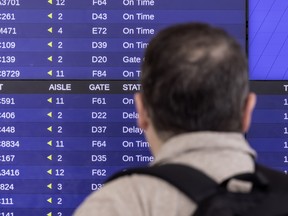Article content
Consumer advocates say proposed changes to Canada’s passenger rights charter will perpetuate loopholes that allow airlines to forego compensating travellers whose flights are disrupted.

Airlines are generally not required to provide compensation for inconveniences to passengers outside a carrier’s control

Consumer advocates say proposed changes to Canada’s passenger rights charter will perpetuate loopholes that allow airlines to forego compensating travellers whose flights are disrupted.
Article content
Article content
Ottawa is proposing new rules surrounding airlines’ obligations when a flight is delayed or cancelled by designating certain factors outside a carrier’s control, such as weather that could affect flight safety, as “exceptional circumstances.”
Advertisement 2
This advertisement has not loaded yet, but your article continues below.
THIS CONTENT IS RESERVED FOR SUBSCRIBERS ONLY
Subscribe now to read the latest news in your city and across Canada.
SUBSCRIBE TO UNLOCK MORE ARTICLES
Subscribe now to read the latest news in your city and across Canada.
REGISTER / SIGN IN TO UNLOCK MORE ARTICLES
Create an account or sign in to continue with your reading experience.
THIS ARTICLE IS FREE TO READ REGISTER TO UNLOCK.
Create an account or sign in to continue with your reading experience.
or
Article content
Under the amended rules, airlines are still generally not required to provide compensation for inconveniences to passengers in situations involving such factors, though there are some exceptions.
But Air Passenger Rights advocacy group president Gabor Lukacs called the weekend announcement of the proposal “deceptive” and said that Transport Canada is actually “preserving the status quo.”
He said that under the newly outlined rules, which are now open to a 75-day feedback period, around half of flight delays and more than two-thirds of cancellations would still not qualify for compensation.
Previously, Canada’s passenger rights charter — which took effect in 2019 — divided flight disruptions into three categories: those caused by factors within the carrier’s control, disruptions within the carrier’s control but required for safety purposes, and those outside the airline’s control.
Passengers had only been entitled to compensation in the first of those categories.
Lukacs said the government’s amended rules merely give a new title to the latter two categories. He called it “semantics.”
Posthaste
Breaking business news, incisive views, must-reads and market signals. Weekdays by 9 a.m.
By signing up you consent to receive the above newsletter from Postmedia Network Inc.
Thanks for signing up!
A welcome email is on its way. If you don’t see it, please check your junk folder.
The next issue of Posthaste will soon be in your inbox.
We encountered an issue signing you up. Please try again
Article content
Advertisement 3
This advertisement has not loaded yet, but your article continues below.
Article content
“They are just renaming the two categories when no compensation is owed as ‘exceptional circumstances,”‘ he said.
“If two-thirds of the flight disruptions are exceptional, it’s not very exceptional. It doesn’t really do …. what the government promised the public to do.”
The Canadian Transportation Agency has been working to amend regulations associated with the Canada Transportation Act since the Liberal government passed legislation last year aiming to tighten rules for passenger rights.
The changes appeared to scrap a loophole through which airlines have denied customers compensation for flight delays or cancellations when they were required for safety purposes.
The reforms also put the onus on airlines to show a flight disruption is caused by safety concerns or reasons outside their control.
The draft regulations published Saturday would require carriers to provide meals to passengers whose flights are delayed at least two hours, along with overnight accommodation if necessary, even in exceptional circumstances.
Ottawa said those factors would also include security threats, unscheduled airport closures, bird strikes, or aircraft damage that could affect flight safety, among other examples.
Advertisement 4
This advertisement has not loaded yet, but your article continues below.
Article content
If a flight has been cancelled, or if a passenger has been bumped, the proposed amendments require the air carrier to rebook a passenger on its next available flight or that of a partner airline, also in any circumstance.
Airlines also have an obligation to rebook a passenger who has missed, or is likely to miss, a connecting flight because of an earlier flight disruption on the same itinerary.
Carriers would have to provide refunds within 15 days, down from the current deadline of 30 days, if a passenger prefers to be reimbursed rather than rebooked when their flight is cancelled, delayed at least three hours, or they are bumped from the flight.
That timeline shift is meant to better align with practices in the U.S. and the European Union, the federal agency said.
However, Lukacs said those regions actually require carriers to deliver refunds within seven days.
“Somehow the airlines managed to convince the government that miraculously, north of the border, apparently reindeers cannot deliver the refund in seven days,” he said.
“Perhaps the refunds come in a horse cart or something.”
Recommended from Editorial
The regulations include a $250,000 maximum fine for airline violations, marking a tenfold increase over existing penalties.
The federal agency said it estimates the proposed amendments would cost carriers around 99 cents per passenger flight annually, or around $512 million over a 10-year period after they come into effect.
Article content
Share this article in your social network